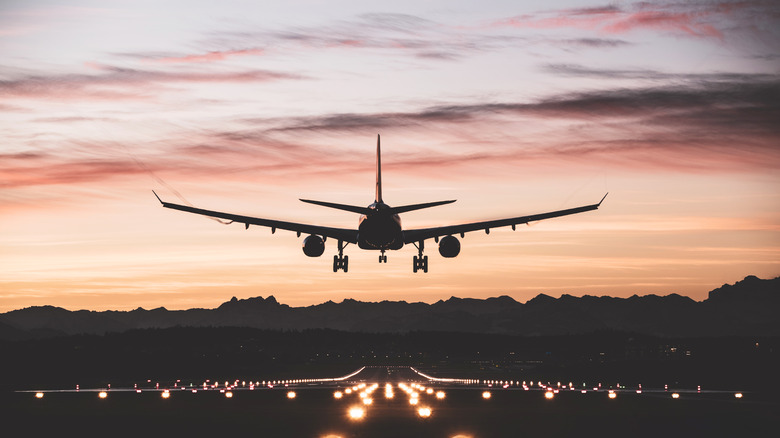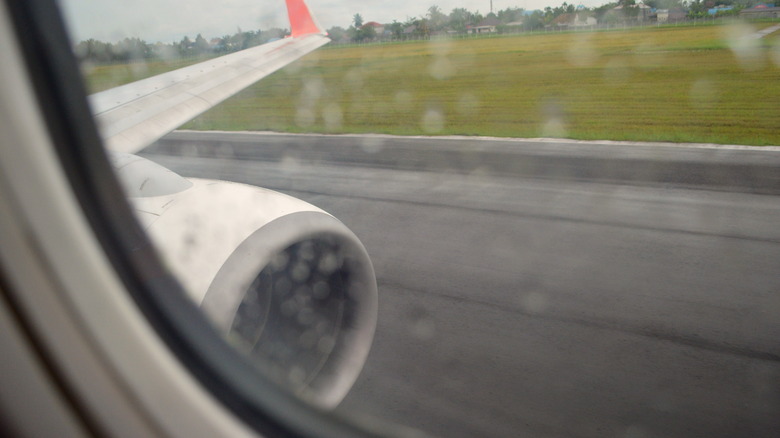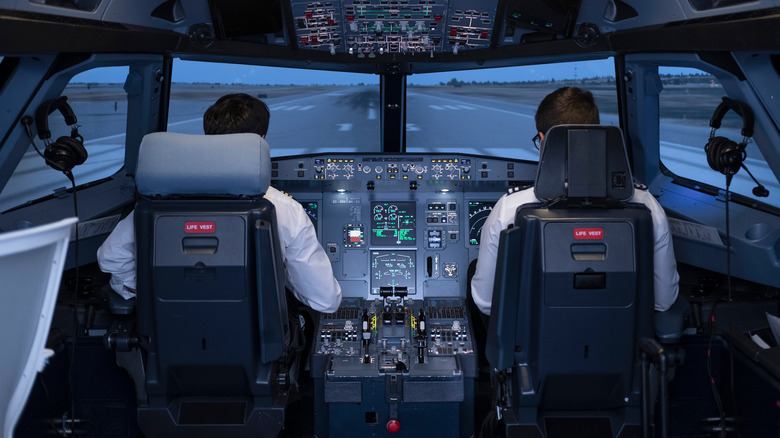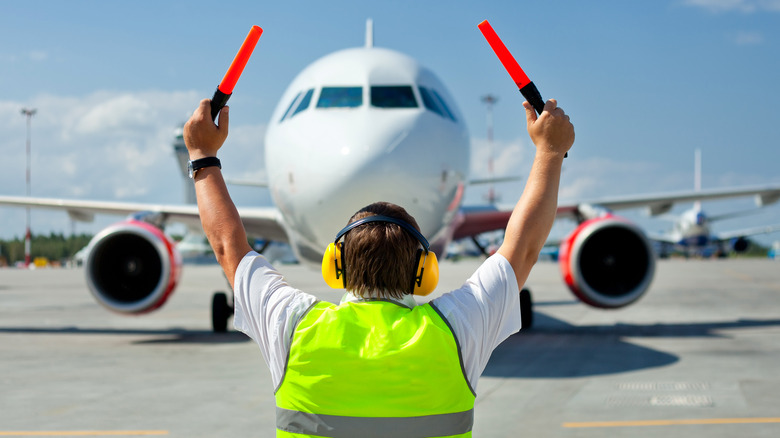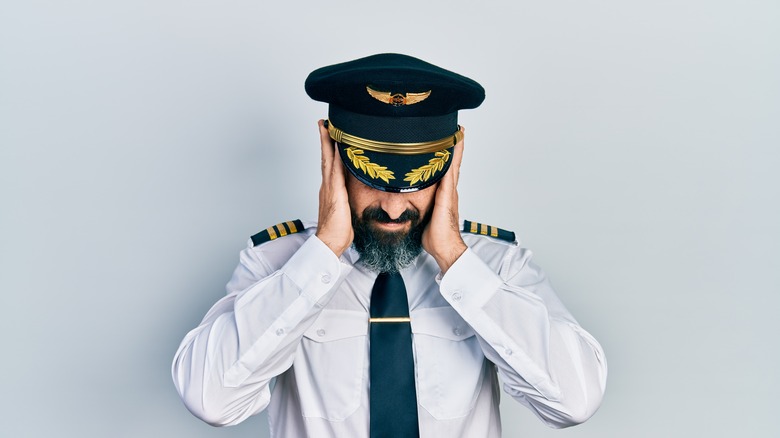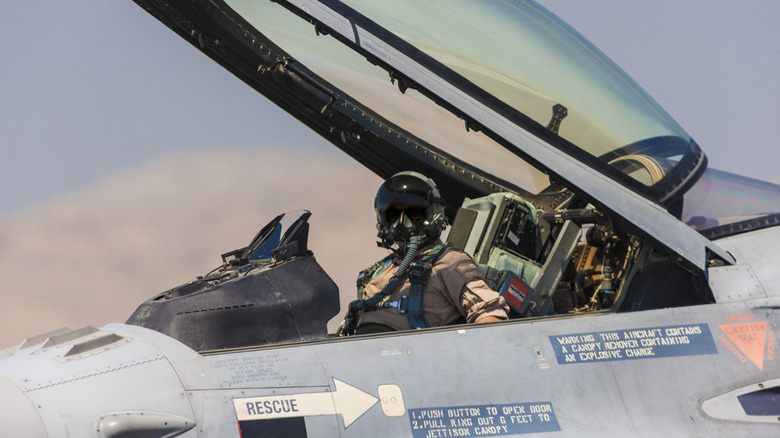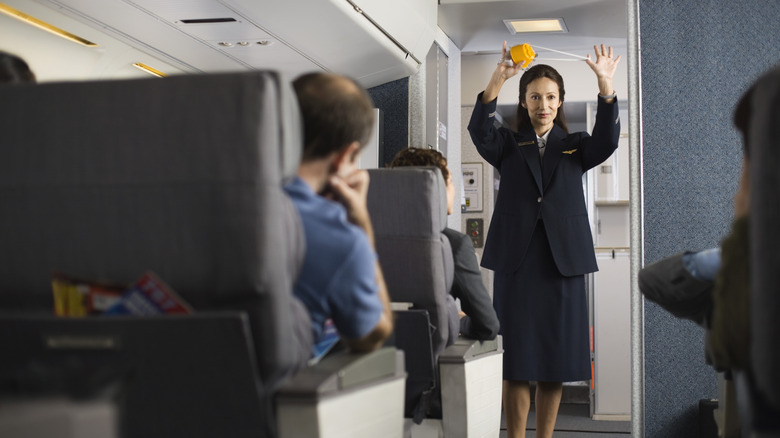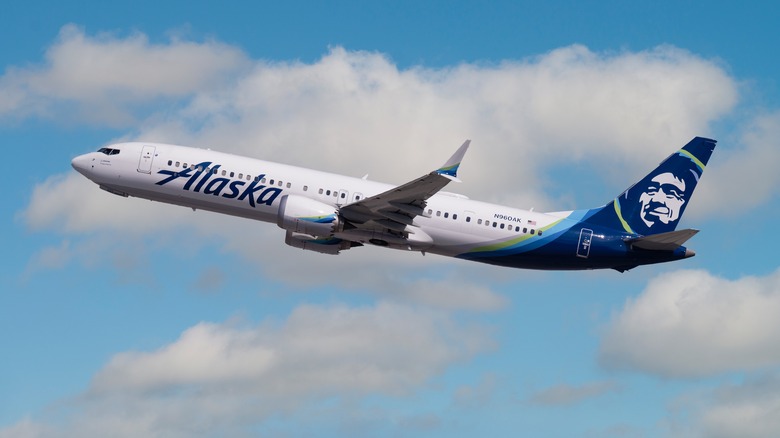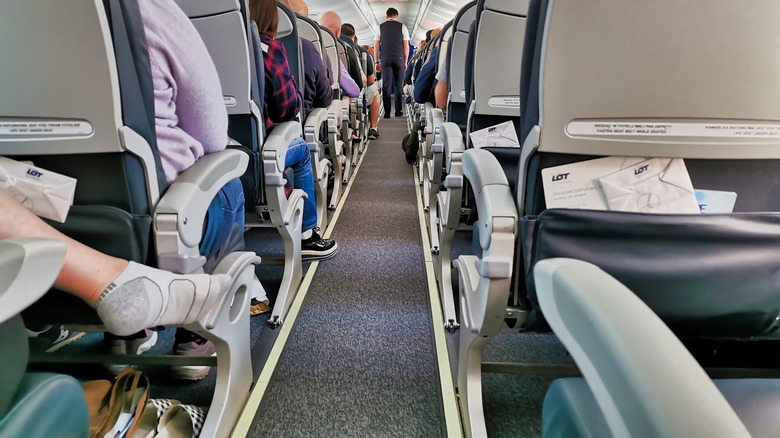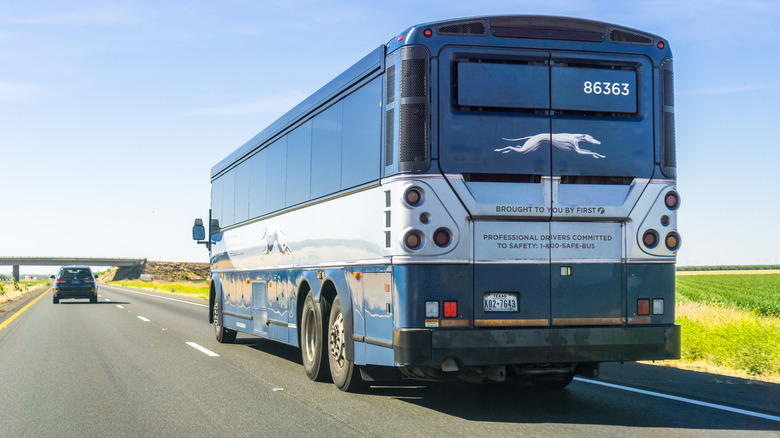10 Things Pilots Wish Passengers Knew About Their Job
Flying fascinates many people, both pilots and non-pilots alike. However, many aviation enthusiasts may overlook certain elements of a pilot's role, or be unaware of key things that make an aircraft function. So SlashGear took some time to talk to a couple of pilots about their jobs and experiences. One is a now-retired aviator who spent his career flying major international routes, while the other is a working commercial pilot who gives people glimpses into his life and career through social media.
Retired captain Richard J. Levy recorded nearly 41 years as a pilot at a major international airline before hitting the mandatory retirement age of 65 (he's even told us the best four commercial aircraft you can fly). Before becoming a commercial pilot, he learned to fly through — and operated C-130s for — the U.S. Air Force. He currently serves as an instructor for another major airline and as a consultant to attorneys involved in aviation litigation.
Captain Brandon Meadows is a commercial pilot known online as "Captain Meadows." He has a heavy social media presence that includes a successful Instagram account, TikTok, and YouTube channel. Meadows is a U.S. Navy veteran, though he didn't serve as a pilot or learn to fly during his time in the military. In addition to his social media presence, he spends his free time helping veterans use GI bill funding to become pilots.
Here are 10 things that Levy and Meadows want passengers to know about air travel.
The landing may not be smooth for good reason
Anyone who has flown a few times will probably have experienced two things. A perfect, feather-light landing that frankly deserves an applause and gives you a deep admiration for the pilot — and the opposite of that. Every now and then, you'll get the sort of jarring landing that feels like it's going to pop a few of your vertebrae out through the top of your skull. While a landing should never be painfully bad, a slightly rough arrival can sometimes be both deliberate and necessary.
According to Richard J. Levy, there are two circumstances that warrant a slightly rough touch. If the runway is wet or short, the plane may struggle to stop in time should the pilot land lightly. A heavier landing helps the plane slow down and either come to a halt in a shorter distance or mitigate the effects of water on the runway. "A firm landing aids greatly in slowing the aircraft from the approach speed of some 130 to 140 knots (150 to 161 miles per hour) to a full stop," Levy explained to us.
Levy also highlights the importance of passing on a compliment or two when a landing has gone well. "Now that you can judge a good landing, next time you experience one in airline flying, please consider stopping by the flight deck on the way off the aircraft, and compliment the pilots," he said. "They'd be ever grateful to you!"
The process of becoming a pilot is complex
In addition to gaining a commercial pilot's license, which isn't easy, prospective pilots need to log 1,500 flight hours — which can take around two years. Then, according to Brandon Meadows, pilots need to meet certain "FAA [Federal Aviation Administration] minimums" alongside "insurance minimums," and the insurance's requirements are even stricter than those demanded by the United States' aviation regulator. Once all that is done, they have the chance of being hired by an airline. When that happens, there's a bunch of aircraft and airline-specific things to learn before they're ready to take to the skies for a commercial carrier.
Once a pilot has qualified, he or she can't just kick back and relax. Although a pilot's license doesn't technically expire like your driver's license, there are some strict rules to follow if they want to continue flying. "We need to log a minimum of three takeoffs and landings every 90 days," Richard J. Levy explained to SlashGear. "If you drop out of (landing) currency, the airline must then run you through simulator training in order for you to be legal and current. Additionally, the pilot must successfully complete what we call 'recurrent training:' annual or semi-annual training evaluation in the classroom and simulator. Finally, we have to pass a medical examination every six or twelve months depending upon if you are the Captain or First Officer."
It takes a lot of people to get an aircraft off the ground
Pilots are arguably the most important people on the plane. After all, an aircraft can't get anywhere without them. However, a commercial aircraft with two pilots and no other staff members on board won't be going anywhere either. Captain Brandon Meadows highlighted a group that's key to an aircraft's safe operation. "Besides the pilots, there are the amazing mechanics that take care of the aircraft and by extension, both the pilots and the passengers," he told us.
Flight attendants are also highly trained professionals who are responsible for a number of key roles aboard the aircraft. As well as relaying safety messages to passengers pre-flight and making sure everyone is following FAA rules, they're also trained to evacuate the plane in an emergency and administer first aid to those who need it. Flight attendants must be versed in things like CPR and self-defense too. So while you may be concerned if you see them rushing around, rest assured that they know what they're doing.
Beyond the staff actually present on the plane, there are lots of other people involved in your flight, including air traffic controllers, baggage handlers, ground staff, caterers, cleaners, administrative staff, and gate agents.
They've heard the jokes before
As you're boarding or leaving a plane, you may be tempted to lighten the mood with a joke. If your quip is topical and original, it might perk up someone's day. But chances are they've heard it all before. And as Brandon Meadows pointed out, that can be a bit irritating.
"Making the old joke of 'Is this your first day' or 'How many times have you crashed' is a tired and unoriginal joke," he told SlashGear. "I wouldn't walk into a restaurant kitchen and ask the chef if they knew what they were doing, nor would I ask a military veteran if he or she had ever killed anyone. Save your dad jokes for the kids. Also, some of us can't grow beards, so if you think we 'don't look old enough to fly,' order another cocktail and sit down." Given how highly qualified pilots are and the amount of things they have to think about before, during, and after a flight, antagonizing them isn't the best idea.
Not all pilots were in the military
Given the expense involved in learning to fly and the length of time pilots need to spend in flight school, you'd be forgiven for thinking that most have some kind of military background. After all, the Air Force, Army, Navy, and various national guard branches don't charge their recruits for flying lessons. The armed forces also provide their pilots with plenty of flight time, which is a crucial part of pilot development.
According to retired captain Richard J. Levy, that isn't the case. Not anymore anyway. Levy himself has an Air Force background, and when the veteran pilot started back in 1977, most of his peers had spent time in the military too. But nearly 50 years on, many pilots cut their teeth at a regional airline or corporate gig rather than in the military.
"It seems the majority of new-hire pilots come from regional airlines, such as SkyWest, Envoy, Mesa, Endeavor, etc.," he told us. "Some come from corporate aviation, such as oil, tech, freight, or entertainment companies. Then there are the 'pipelines' from initial flying lessons to the major carriers, such as Southwest's 'Destination 225' and American's "AA Cadet Academy." Levy also believes that these "pipelines" could become a more common part of pilot training. He pointed toward European carriers, which tend to hire new pilots with zero flight time and then train them in-house.
Many pilots are aviation nerds
One younger pilot that didn't get his wings in the military is Captain Brandon Meadows. To confuse things further, Meadows is a military veteran, but learned to fly outside of the forces. He explained that many of his colleagues are "airplane nerds" and just really like flying. This in itself can be a gateway into the profession. So if you're planning on getting a private pilot's license, or you're already proficient in a smaller aircraft, then you could have a dream career ahead of you.
"Most of us are just airplane nerds that are good at math and just really like flying," told us. "It's our passion. There are numerous civilian flight schools across the country, and lots of people (such as myself) got their start flying from talking to a good ol' boy at an airport who owned his own plane and had too much time on his hands."With that being said, if you are an aviation nerd as well as a veteran, you can potentially get flight school paid for through the G.I. Bill (also known as the Servicemen's Readjustment Act of 1944). Helping veterans get their pilots licenses this way is something Meadows does on a regular basis.
Flight attendants aren't sky waiters
When you're in the air, a beer or cocktail can help ease anxiety, and a light snack can fend off hunger pangs and keep everyone on board happy. The grub and drinks tend to come courtesy of the flight attendants, who will regularly wheel a trolley down the aisle, serving passengers as they pass. While you may be anxious to grab a drink and stroopwafel, it's important to remain patient until the crew gets to you. "Don't get me wrong: when I'm going on vacation, I like to have a couple cocktails while sitting in the back just like anyone else," Brandon Meadows explained to SlashGear. "However, if your drink isn't coming fast enough, or if the plane is out of pretzels, it's not the end of the world. Cut the crew some slack, and remember that they're humans too."
Service can be delayed for a few reasons. One of the more common causes is turbulence. If the plane hits rough air and isn't completely stable, then wandering around it isn't exactly safe. Unless they're dealing with a safety issue, flight attendants should really be strapped to their jump seats just as you're buckled into your own. Handing out snacks and drinks is actually a very minor part of their very complex job.
As Meadows told us, flight attendants are highly trained, highly skilled, and in a position of extreme responsibility — so topping up your rum and coke may drop down the priority list from time to time."The crew is there to conduct a safe flight: that is the number one priority. Just like the pilots and mechanics, flight attendants go through some tough training to get to where they are."
Despite some high-profile incidents, Boeings aren't that dangerous
In recent years, several high-profile safety incidents have dented Boeing's reputation. If you're reading about a 737 MAX jet falling from the sky, or a door falling off the plane mid-flight, or the wheels falling off a plane, you may start thinking, "If it's a Boeing, I'm not going." But according to Richard J. Levy there isn't a noticeable safety difference between Boeing and Airbus.
"With regards to safety, it really does not matter if the aircraft is a Boeing or an Airbus," he told us. "It also does not matter if the aircraft is a Boeing 737, Boeing 747, an Airbus A-380, an Airbus A-320, or any other model of commercial aircraft. I receive almost daily airline safety newsletters of what happened yesterday from around the world of commercial airline flying. When and where did a commercial airline flight take off and have to return to the point of departure due to an issue? Or when, where, and why did a commercial airline flight have to 'divert' and land at a different airport than the planned destination?"
In terms of general news stories, Boeing has certainly had more high-profile incidents than other manufacturers in recent years. But it's important to remember that not every mechanical issue, diversion, and delay makes the news — only a small fraction do. A door blowing off is spectacular and worth reporting, while a less obvious part failing and causing an incident-free diversion is a bit too boring to end up in print. As Levy highlighted: "'News flash,' as my late wonderful mother used to say: flight diversions happen as much to Airbus aircraft as to Boeing aircraft. That's aviation, folks! Things happen in real life."
Be considerate of other passengers
Sometimes people struggle to get along. Add in some natural belligerence to the fact that airlines are essentially cramming several hundred travel-stressed individuals into a metal tube for X amount of hours, and the number of in-flight meltdown videos we see suddenly seems a bit low. On the flipside though, everyone on a plane is suffering through the same inconvenience. We're all in it together, and it makes sense to be as considerate as possible to each other. Give that person in the middle seat both armrests, don't recline your seat in basic economy, and try not to get food absolutely everywhere.
There are, of course, varying degrees of inconsiderate passenger. Brandon Meadows took the time to highlight one particular traveler who went far beyond the line. "Has anyone seen that viral photo going around the internet of that passenger in first class that had his or her shoes off, and was swiping the entertainment screen with their feet?" he asked in our talk. "That's gross. The crew, the passengers ... absolutely no one wants to see that. Ew."
Even if you're stumping up for a first-class ticket, you should really remember that other people are on the plane with you, and plenty more will have to use it after you. So keep your shoes on. Beyond that, take advantage of the alcohol wipes flight attendants hand out and give your seat a thorough clean. You have no idea who's been swiping away there before you.
Nobody forced you to get on a plane
One major point Captain Brandon Meadows made was centered on the fact that flying isn't mandatory. "You came to us for a safe flight; we didn't solicit or force you to be on an airplane," he told SlashGear. "Relax. Have fun. We know what we're doing." And it is true.
The "no-fly list" isn't exactly what people make it out to be — unless you're a terrorist, international arms dealer, or someone else who's done something to seriously upset the federal government, blanket bans on air travel aren't really a thing. Even if you do something egregious enough to warrant a news story and have a couple of police officers greeting you at the gate afterward, chances are you'll only end up on one specific airline's naughty list. But flying is still a privilege rather than a right, and you should remain polite and courteous while traveling.
Similarly, if you really do hate flying, other forms of transport are available. You can still take a car, or a bus, or a train, or a boat, or even walk it if you're determined enough. There's no need to board a plane if it makes you miserable to the point where you're going to make it other people's problem too.
